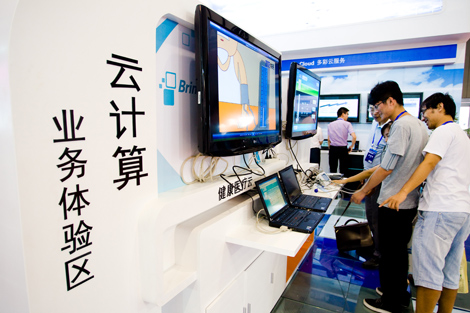ZTE eyes 80% sales from overseas
Updated: 2011-10-29 09:35
By Shen Jingting (China Daily)
|
|||||||||||
|
A ZTE Corp booth promotes the company's cloud-computing technologies at an exhibition in Nanjing, Jiangsu province.?[Photo /?China Daily] |
Telecom-gear giant looks for greater rewards from foreign markets
BEIJING - The overseas market may eventually contribute as much as 80 percent of ZTE Corp's total sales, said Hou Weigui, the president of China's second-largest telecom-equipment maker by sales.
At a news briefing in Beijing on Friday, Hou said ZTE's overseas presence has expanded in recent years.
The Shenzhen-based company took its first step toward globalization in 1995, when it established branches in Indonesia.
Overseas sales amounted to 20.8 billion yuan ($3.27 billion) in the first half of this year, accounting for 55.7 percent of its total sales.
Hou said the figure will continue to grow and may reach as much as 80 percent, but he did not predict when ZTE will realize that goal.
"We are particularly interested in big countries, where market demand is large," said Hou.
However, political concerns from foreign governments and currency volatility have already hurt ZTE's global expansion.
Like its larger rival Huawei Technologies Co, ZTE has also faced difficulty in selling telecom equipment in the North American and Indian markets. Hou also claimed that the US government has hindered ZTE's sales because of concerns about national security.
"It's useless making further efforts (to persuade the US government to trust the company). The problem cannot be solved," Hou said.
He added that ZTE will only perform well in less sensitive areas, including the fields of mobile phones and enterprise IT solutions.
Another challenge facing the company is that of currency volatility, which has eaten away at profits. The company reported net profit of 1.07 billion yuan in the third quarter, a year-on-year decline of 21.5 percent. However, the comparative weakness of the euro against the stronger yuan meant that earnings from European sales were lower than expected.
"We cannot ignore the currency issues any more. Measures should be adopted to help avoid this risk," Hou said, without elaborating.
Founded in 1985, ZTE has grown into a leading global vendor of telecom infrastructure equipment, along with Ericsson AB, Nokia Siemens Networks BV and Alcatel-Lucent SA.
"ZTE's success is attributed to hard work, creativity and government support," said C.W. Cheung, Asia-Pacific consulting director at the researcher Ovum.
"ZTE's competitiveness in low price and high quality helped it stand out amid the global financial instability of the last three years," Cheung said.
However, given the weaker investment in telecom-network construction from global carriers, makers of telecom equipment worldwide have started to tap new fields to boost growth.
Hou said ZTE has seen a fast growth rate in terms of its mobile-phone business. The company expects to ship 12 million smart terminals in 2011, with total terminal shipments reaching 120 million units, up from 90 million in 2010.
He Shiyou, executive vice-president of ZTE, also said that the company wants to become one of the world's top three mobile-phone vendors by 2015.
Hou said ZTE would like to rely on flagship products to increase its sales of mobile phones. The ZTE Blade V880, an Android-based smartphone, has sold more than 5 million units worldwide. The company said the number of ZTE Blades sold in China has so far surpassed Apple Inc's iPhone series.
Related Stories
ZTE hopes to make more US inroads 2011-10-28 09:26
Jobs' quit will provide more opportunities for ZTE 2011-08-26 10:08
ZTE aims to beat mobile device targets 2011-08-10 10:20
ZTE Corp ships 35m handsets in H1 2011-08-09 09:58
- US finding bodes ill for China's exporters
- EU bailout details needed
- ZTE eyes 80% sales from overseas
- China's foreign trade to top $3t this year
- China's aviation biofuel test a success
- Central bank to regulate prepaid card market
- US energy firms seek co-op with China
- SMEs' shortage of funds boosts PE/VC firms











